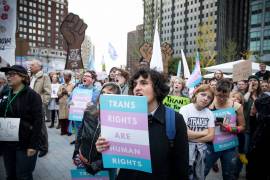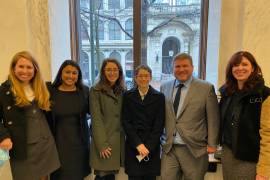
Another Huge Week for LGBT Rights!
Blog Search
In a movement for equality, legal decisions and actions are like building blocks: Each one sets the stage for the next.Two developments this week illustrate this point — and they are big.
First, in California, in a case in which Lambda Legal submitted a friend-of-the-court brief, the U.S. Ninth Circuit Court of Appeals issued a very significant ruling addressing the use of peremptory challenges to strike individuals from serving on a jury based on their sexual orientation.
It is hard to overstate the importance of the Ninth Circuit’s ruling in GlaxoSmithKline v. Abbott Laboratories. Yes, it determined that striking potential jurors because of their sexual orientation violates the Equal Protection Clause of the U.S. Constitution, just as exclusions of racial minorities and women do.This ruling protects lesbians, gay men and bisexuals from being excluded from this important role in the civic life of our country.
But, in arriving at this decision, the Ninth Circuit also determined that discriminatory classifications based upon sexual orientation must be given heightened scrutiny by the courts.Relying on the logic of the historic U.S. Supreme Court ruling in U.S. v. Windsorthat struck down the core section of the so-called Defense of Marriage Act (DOMA), the Ninth Circuit determined that classifications based upon sexual orientation must at least meet the same standard of review as those based upon sex:They should be presumed to be unconstitutional.
That presumption places the burden on those defending such classifications to establish that they substantially further an important government interest that was the actual purpose of the government law or action (rather than some hypothetical or after-the-fact justification).Sexual orientation discrimination cases brought in the nine western states that comprise the Ninth Circuit will be much more likely to succeed, because this test is far more difficult for those trying to defend antigay government action to meet.
The implications for ongoing litigation seeking full equality for LGBT individuals and families is huge. For example, in our Nevada marriage equality case now before the Ninth Circuit, Sevcik v. Sandoval, we argue that Nevada’s statute denying same-sex couples Nevada marriage licenses serves no legitimate state purpose, save to discriminate against certain couples based on their sexual orientation and sex. The Ninth Circuit’s ruling in GSK means that the Court will subject Nevada’s discriminatory marriage ban to heightened judicial scrutiny— and we don’t think the discriminatory exclusion will survive. The ruling also provides a route forward for the dozens of other marriage equality cases pending in other state and federal courts across the country.
And then there is this week’s announcement by the Virginia Attorney General that he will not defend that state’s marriage bans, as his office has determined the bans are unconstitutional. As we discovered in California during the Prop 8 litigation, and then again in Illinois,when the duly authorized state officials themselves determine that state laws do not pass constitutional muster and decide not to defend them, it becomes increasingly more difficult for backers of discrimination to make their case.
Lambda Legal and the ACLU are litigating a marriage equality case in Virginia, and there is another case pending there as well. We will continue vigorously to argue our case. But, as more states’ attorneys general and governors refuse to defend discrimination, and as more discriminatory statutes are subjected to appropriately heightened judicial scrutiny, it is increasingly clear that not only is the writing on the wall concerning full equality and inclusion for LGBT individuals and families, but it is being written in indelible ink.




